Welcome to the world’s sexiest alien-based religion. Tony Barrell goes camping with the Raelians
THE SUNDAY TIMES, 2001
More than 400 men and women sit patiently, serenely, in the raked seats of a roomy hall in the middle of Quebec, Canada. Outside the hall are the clusters of tents, caravans and log cabins that make up the rain-lashed campsite known as Les Jardins du Prophète. Radiating out from the campsite is a seeming infinity of spotted cows and towering silos.
It’s Saturday night, the start of a week-long “Raelian awakening seminar”, and the silence in the hall is only broken by the occasional whisper or kiss. Suddenly a faint shaft of light penetrates the room, to one side of the stage, and hundreds of white djellabas rustle as the audience stands. This is a pre-show ovation for their leader, Rael, the prophète of these jardins, who we are told is “the most extraordinary man on the planet right now”. Ultraviolet light picks out the white robes of a welcoming party by the door, like a gauntlet of well-wishers at a wedding. For a long time, nothing happens except the building of suspense.
His bearing and his dress sense are somehow redolent of the late Freddie Mercury, circa Live Aid, 1985
Then come the gasps and cheers and whoops as he strides in – a diminutive bearded man in what looks like a 23rd-century astronaut’s natty white leisure suit, complete with matching white shoes. His thinning dark brown hair is tied into a knot on top of his head, and around his neck he wears a big medallion, its motif a kind of Walnut Whip swirl inside a Star of David – the Raelian crucifix, if you like. His bearing and his dress sense are somehow redolent of the late Freddie Mercury, circa Live Aid, 1985.
You may have assumed that Rael is one of those dime-a-dozen showbiz evangelists who tell you to give your life to the Almighty, and who climax their act with the faithful jitterbugging out of their wheelchairs. Wrong – he doesn’t even believe in God. But he does have a message for us all that, if it is true, amounts to the biggest news story in the history of humanity.
It’s a gigantic “if”. He could be the sanest and most trustworthy human being on the planet. But the message is so Earth-shattering that many think he is either a charlatan, a mischievous performance artist, or a few hit singles short of a jukebox.
You’re going to have to make up your mind about him. And you’re going to have to do it fast, before the spaceships arrive.
**************************************************
Twenty-eight years ago, Rael was just plain Claude Vorilhon, a 27-year-old French racing-car enthusiast with a wife, two children, and his own motor-sports magazine, Autopop. By his own account, on December 13, 1973, he was walking and jogging around Clermont-Ferrand, in the Auvergne region of France, in need of a break after a full year of racetrack coverage. He reached a volcano called Puy-de-Lassolas, and lingered for a while. Just as he was about to leave he saw a flying saucer descending from the sky. It was about 7 metres in diameter and 2.5 metres high, and made no sound. As the ship hovered, a trap door opened in its base, a stairway dropped to the ground, and a friendly 4ft-high space alien with a beard and long black hair, dressed in a green one-piece suit, came out and greeted him.
Vorilhon was invited inside the craft, where the alien concluded the meeting with a request that the Frenchman return tomorrow at the same time, with a Bible and something to take notes with. He ended up returning daily for the next five days, listening with wonder as key parts of the good book were reinterpreted for him. The key revelation was that the Hebrew word “Elohim” had been mistranslated as “God”; it is really a plural, and means “those who came from the sky”. Humanity, and in fact all life on Earth, was made by alien scientists – people from the same distant planet as this 4ft visitor – using highly advanced genetic technology. The alien gave Vorilhon his new name, Rael, and asked him to spread the news, gather followers, and arrange for an embassy to be built to welcome back the Elohim. The embassy should be built in a pleasant country with a mild climate, and should have a swimming pool and a landing pad for a 12-metre-diameter spacecraft.
He was whisked off from France to a planet where he met Jesus, Mohammed, Buddha, Moses and Elijah
That wasn’t all. Less than two years later, on October 7, 1975, having barely begun to fulfil his strange mission, Rael was contacted again. More than that – he was whisked off from the Perigord region of France to the Elohim’s own planet. On this paradisiacal world, where pink and blue squirrels with bearlike heads frolicked in beautiful flowering trees, and people flew around with the aid of special belts with big buckles, Rael met the great prophets of Earth, kept alive through the miracles of science. He met Jesus, Mohammed, Buddha, Moses and Elijah. Rael was told that his own birth, in September 1946, had been arranged by the Elohim, who wanted to send a final prophet to Earth after the atomic bombs were dropped on Hiroshima and Nagasaki. The alien who fathered him, he was told, was the same “man” who had sired Christ, making them half-brothers.
Rael has documented the whole shocking story in a series of books with blissed-out, starry-eyed titles – such as Extra-Terrestrials Took Me to Their Planet, and Let’s Welcome Our Fathers from Space – which are usually the starting points for his followers. Many talk about the day they discovered “the messages” – Raelian shorthand for the information imparted by the Elohim – and say it was like finally “coming home” or “finding themselves”. Rael’s story is so appealing, if not entirely convincing, that the movement now claims 55,000 members across 84 countries, and over $7m has been raised towards the cost of building the embassy.
On that Saturday night, as Rael gives his introductory talk on stage, he does an audacious thing: he risks alienating his flock by calling them all misfits. You are all here, he says, because you are moutons noirs (black sheep); where you come from, you didn’t fit in, you saw things differently. Here, you all fit in. At this, long rows of men and women in white, African-style djellabas (compulsory clothing for the lectures) clap and cheer in unison.
Make no mistake, this isn’t a crowd from Rent a Retard. These black sheep are largely respectable professionals – accountants, secretaries, lawyers, carpenters, shopkeepers, nutritionists, demolition operatives – in their twenties, thirties, forties or fifties. Most are from Canada, but others are from the United States and further afield – South America, even Australia. A surprising proportion of them are outwardly beautiful, with dazzling smiles and endless, pre-Raphaelite hair. And that’s just the blokes.
Many Raelians stroll around the grounds naked, or cavort in the lake with beach balls as if performing in a 1970s porn film
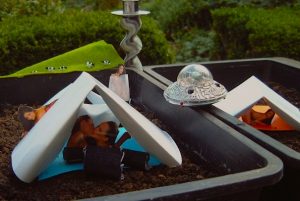
All this physical beauty makes a potent combination with the Raelians’ attitudes to the human body and sex. We were put on this planet to have pleasure, stresses Rael, and we should have no truck with the guilt trips and hang-ups of other religions that condemn nudity, masturbation, premarital copulation and contraceptives. During the week, many Raelians stroll around the grounds naked, or cavort in the campsite’s lake with beach balls as if performing in a 1970s porn film. Even during lectures, they are apt to show their love for one another with kisses and tender caresses. In the window of a shop outside the lecture hall, a prominent notice advertises condoms for sale, three for one Canadian dollar. And when you sign up for the awakening seminar, you receive a set of five coloured ribbons that you can wear round your wrist to signal your sexual preferences. A green band means you are looking for one partner; red means you are seeking “multiple pleasures”; pink means you are gay; purple, bisexual. You’re not obliged to be a rampant love hunter, though: you can choose to wear a white band, which gives a “keep off” message.
As Rael paces up and down on stage like a stand-up comedian, charming the faithful with philosophies, homilies and gags, on-the-spot translators send English and Spanish interpretations of his words through little personal radios into the headphones of non-Francophones. This means that each joke or provocative statement sets off a kind of Mexican wave of laughter or applause. He tells us that the theme of this week is “play”; that we should all look for the seven-year-old child inside us and learn to be playful again. At the same time, he advocates “neurobics” – doing exercises to increase the neurons in our brains, and therefore make us more intelligent. In the first of many tirades this week against the Catholic Church, he condemns the Pope as anti-play, anti-pleasure, anti-intelligence. Despite being hedonistic athiests, Raelians are also creationists, so evolutionists get it in the neck too. Rael tries to make the followers of Darwin look stupid by walking sideways on stage like a crab, which he identifies as an anomaly disproving centuries of scientific theory. The Elohim started their project on Earth just 25,000 years ago, he says, and they made all creatures, great and small, as they are today.
Earlier, it was whispered that there would be a “surprise” this evening. Some of us with rumbling tummies dared to hope that this would involve dinner. Quite the opposite: it is announced that we have to fast – drinking water only – for 24 hours. It’s all part of the “cleansing process”, apparently, and only those with certain medical conditions are exempted. Nobody is allowed to speak to each other for a day, either – and that means total silence even between couples in the privacy of their tents, caravans or cabins. It starts now, says Rael; you must not applaud me as I leave the stage. The prophet steps down, to a dramatic absence of the claps and hurrahs that he lapped up when he appeared.
The next day, people pass on the campsite and smile wordlessly at each other, while Raelian security staff and “guides”, the movement’s rough equivalent of priests, zip around in buggies and golf carts, giving the place the air of “the village” in the 1960s TV show The Prisoner. Of course, it is against human nature not to speak, and people start to implement an unwritten compromise by whispering. And if you have ever had orders or instructions whispered at you by hungry people – “No, you can’t park your car here;” “No, there’s someone sitting there;” – you’ll know just how sinister and Brando-esque it sounds.
The fast is broken in the campsite’s vast dining hall on Sunday evening. Hundreds of Raelians sit straight-backed in their djellabas on long tables, each person in front of a meagre plate of food – an apple, a hunk of bread, a muffin and a splodge of what might be mushroom risotto. Only when Rael turns up and tells them to are they allowed to they eat, and they have to do it in a sensual fashion, closing their eyes, puncturing the flesh of the apple with their fingers, and finally biting into it simultaneously as Rael gives gentle instructions in his best Serge Gainsbourg ‘Je T’Aime’ voice.
Around 9am each day, there is a guided mass meditation. We sit or lie down as a man with a similarly soothing voice asks us to imagine we are soaring up into the sky, leaving Earth behind, visiting another planet. On one occasion, we use our imaginations – “a fantastic power the Elohim have given us” – to become drops of humble H2O. “You are this water… this eternal water… composed of matter that has always existed… and will always exist.” This taps into the Raelians’ belief in total infinity, in both space and time. You see, the Earth just a subatomic part of a vast being that lives on a planet that is just a subatomic part of… and so forth, for ever and ever. And inside us, there are endless galaxies of infinitely diminishing sizes. There was no beginning in time, either, and there will be no end. This is handy when you need to answer awkward questions like “Who created the Elohim?”, because the answer is that they were created by other aliens, who were created by other aliens, who… Need I go on?
For Raelians, cloning is the scientific means to the goal shared by most other religions: eternal life
To continue the story of infinite creation, human beings will eventually have to use genetic science to create life. “The greatest gift” we can give the Elohim, says Rael at one point, is to “elevate our level of science” and “resemble them”. This is the driving philosophy behind the Raelians’ most audacious project so far: their programme to clone human beings. Even now, a small team of Raelian scientists is hard at work in a laboratory at a secret location, preparing to implant the DNA of a dead baby into the womb of a surrogate mother. For Raelians, cloning is the scientific means to the goal shared by most other religions – eternal life. When Rael took that trip to the Elohim’s planet, they showed him how they make clones of themselves and continually transfer their personal essence – their personalities and memories – to those new bodies as a form of rejuvenation.
When the 45-year-old French scientist Dr Brigitte Boisselier takes the stage at the seminar, she receives a standing ovation to rival Rael’s. As the head of the human-cloning project, Boisselier has gained instant notoriety through interviews on news programmes in the United States. Their first cloning laboratory was in the US, until the Food and Drug Administration (FDA) found it and ruled against their activities. “It doesn’t bother me that the FDA found us,” she announces cheerfully. “Until then, people weren’t taking us very seriously. Suddenly the FDA gave us credibility. It was very funny.” Less funny are the death threats she continues to receive for her devotion to the cloning cause – the e-mails from around the world telling her to stop playing God, or she will burn in hell. But she believes in neither God nor hell, and is so pro-cloning that her own daughter, Marina, is one of the project’s 50 volunteer surrogate mothers.
Later, I ask Brigitte Boisselier if opening the human-cloning floodgates wouldn’t cause overpopulation. “No,” she says. “If you clone yourself, you are choosing to perpetuate yourself using your genes, without mixing your genes with somebody else’s. I believe that it’s everybody’s freedom to do that. But if you do that, I don’t think you should reproduce naturally, so there should be some kind of regulation.” That would radically transform society, wouldn’t it? In demographic terms alone, you’d have fewer children and more adults. “I think it’s a blessing that there would be fewer children. We are reaching a level where there are too many.”
Human cloning seems very possible, but shifting the self from one body to another sounds unlikely, I say. “That’s in 50 years’ time from now, hopefully sooner, we don’t know. But there are already experiments in memory uploading.” But even if my memory bank and my personality, whatever that is, were transferred to a DNA-perfect clone of me, I don’t believe it would be a continuation of my life; I don’t have faith that it would be me looking out through those eyes. “What is you, then?” she laughs. “If you think that your self is not only your memory, your personality and your genes, what is left? Some spiritual thing that you call the soul – and I don’t believe in the soul.”
But she does believe in angels, because she is one. She belongs to a special order within the movement, the Order of Rael’s Angels, set up over three years ago at the telepathic request of the Elohim. They seem to be the Raelian equivalent of nuns, except that many of them look gorgeous and they don’t wear habits, though they can sometimes be identified by cute necklaces of fluffy feathers. Stuck on a wall outside the lecture hall, and surmounted by feathers, is a transcript in French and English of the order’s founding statement. “The Great Moment is getting inescapably near,” it begins. “We will be coming soon…” The aliens state that they love us, and would like some human beings to “have the possibility to get close to us and show us their love”. For this reason, “we ask our Last Prophet, Rael, to set up a Religious Order. This order will gather young women who consciously wish to put their inner and outer beauty at the service of their Creators and of their Prophets, when we arrive at the Embassy”.
The Elohim are expected sometime before the year 2035, says Rael, when they will bring along Jesus Christ and the other VIPs he met on their planet. “Meanwhile,” the founding statement continues, “they will prepare themselves for this long awaited day by being at the service of the Last Prophet, Rael, and by tending to his well being whenever necessary…” Within the order is a sub-order, the Chosen of the Elohim, who “commit to reserving their sexuality only for the Elohim or for the Prophets… They will be recognised by the pink tinge of their feathers. They will commit to having no sexual relationships other than with the Elohim or their Prophets…”
Don’t whatever you do, call the Raelians a “cult” or a “sect”. Rael hates that. Journalists constantly malign them, he says; they go on and on about sex; they look for negative things and if they don’t find them, they make things up. “If merde [excrement]sells more than roses, they sell merde,” he says. But in another lecture, on the subject of self-love, he tells us he couldn’t care less if we all hated him. “I love myself,” he says. “The more you love yourself, the less you will need love from others.” He’s big on love.” Putting money in the cup of a blind man without him seeing is love, he says. “Requiring a thank-you is commerce.” People give him gifts all the time, he says – and some do it anonymously, putting money in an envelope and saying: “Give it to Rael.” On the final day of the seminar, a Raelian guide reminds us that Rael is not on a salary – he spreads the messages out of love. Raelian members can donate a minimum of 1% of their income to the movement. Also, there are people at the door as we file out, and if we “feel like giving to our prophet to satisfy his physiological needs, and perhaps more, because he deserves so much more”, we reach into our pockets.
At least we have pockets today. For one of the last meditations, we were asked to shower beforehand, ensure we had clean hands, and bring a small mirror. We had to get our kit off and feel our own bodies, all over. This is “sensual meditation”, a means of “awakening the spirit by awakening the body”. The second part of the exercise involved pairing up and exploring someone else’s body as they lay on their stomach. Oh, and the mirror? That was for taking a rare look at our own anus. The only “mirror” I had was a CD single. I owe an apology to the New Zealand singer-songwriter Neil Finn.
**************************************************
I have been granted an audience with Rael. Accompanied by several Raelians, I enter his office near UFOland, the Raelian flying-saucer museum that adjoins the Jardins du Prophète. We have to walk past several nude pin-ups of his young wife, Sophie, to reach his desk. It’s a hot day, and he is wearing a white singlet, so you expect him even more to start singing ‘We Are the Champions’. Was he surprised when he discovered he was the brother of Jesus Christ? “No,” he says. “I think if I was a religious Christian man, that would have been a terrible shock. But I was an atheist, and never baptised.”
Does he still receive telepathic messages from the Elohim? “Yes, once a year, on August 5 – very short, just telling me which country to go to, to talk.” Why August 5? “It’s the last day of the year. August 6, in memory of Hiroshima, is ‘Happy New Year’ for Raelians.” The year 56 began this August, he explains. “I asked the United Nations to adopt a new calendar, because it’s disrespectful to two-thirds of humanity to use a Christian calendar.”
I miss the lifestyle I saw on their planet. Everything is clean and there is no violence
Does he miss the Elohim when they aren’t in touch? “I miss the lifestyle I saw on their planet more than them personally. When you see their technology, everything is really primitive here. And you get everything you want, like that [he clicks his fingers], there is no disease, no suffering, no pollution. You put this belt on and you are transported. Everything is clean and there is no violence. I don’t know how it works – I’m a very primitive man myself.” In the past I have interviewed people who claim to have been abducted by aliens. Would that be the Elohim? “I don’t think so. And I don’t think there was anybody abducted, not in our time. I think many people drink too much alcohol, many people use drugs. I wasn’t abducted: they asked me if I wanted to go, and I could have refused.”
Does he have a site for the alien embassy yet? “No. We have some good contacts, but nothing.” He has said that the Elohim favour Israel, because the original Jews were the progeny of Elohim men and human women. “That’s still our priority. But they have refused seven times, so now we have the authorisation to ask every country of the world.” Do you have enough money to build? “Money is not a problem. We don’t have enough, but we can manage it with credit, and these kinds of things.” Surely some humans will be hostile when the Elohim return. “For sure. I don’t think that if Jesus comes back and goes to the Vatican, John Paul II will give him the key and the money and everything. And the same for the Muslims. There will be a lot of opposition, fanatical God-believers saying they are not true.”
One of the rather Timothy Learyesque messages of the seminar was that we must think for ourselves, and not blindly obey people in authority or uniform. But Rael had us obeying orders not to eat or converse, from people dressed in white. “Just on the first day, yes. Some members are very rich, some poor, some elegant, some not – so if everybody’s the same, you lose the artificial things which make you think you’re better. That’s the process of the first day, and it’s a lesson in humility.”
He often says that we should seek to improve our intelligence, and even that only very intelligent people should run the world. If there was a stupid person in the movement, would he ask them to leave? “No, it’s not possible. Because stupid people don’t join the movement.” He smiles a cheeky smile, erupts with laughter, and the other Raelians in the office applaud.
How exactly do the “angels” look after him? “They bring me water sometimes.” He laughs – this is just a hint that his glass is empty. Does he train the angels? “No, there is a group of super-angels, and they teach how to be feminine. Femininity’s a very important value.” So they have to be beautiful? “ No, it’s not necessary. Those who will be in direct contact with the Elohim when they arrive have to be very beautiful, yes. Some of them are old women.” Some would conclude that there was something sexual going on. “They can think what they want. The more numerous they are, the more difficult it is to say that. I may take care of three angels but not 300, not at my age.” He chuckles charmingly, charismatically.
What will happen to the movement when he dies? “It’s already prepared. There are 25 bishops in the world, and they will vote and elect a new ‘guide of guides’ to replace me.” But he could be “reborn” into a new, cloned body and come back to Earth, couldn’t he? “I don’t want to, thank you very much,” he laughs. As the Elohim’s last prophet, his future is assured on the home planet, whizzing around in the sky amid the beautiful people and the pink and blue squirrels. Why would he ever want to return to Earth?
Shouldn’t there be a movie made of his life? “I have been waiting for that for 20 years. I wrote a manuscript and I sent it to many people in Hollywood. Because it will help me: I am very lazy, and instead of going to many countries giving speeches, a movie would be the best thing.” The leader of the British Raelians, he says, is Glenn Carter, who has played the title role in Jesus Christ Superstar on both stage and screen. Rael spoke to Carter a week ago, he says. “I said, ‘Maybe after I die, you will play me, in a new movie called Rael Superstar .’” I suppose it’s unrealistic to expect a religious leader to be a shrinking violet. ♦
© 2014 Tony Barrell
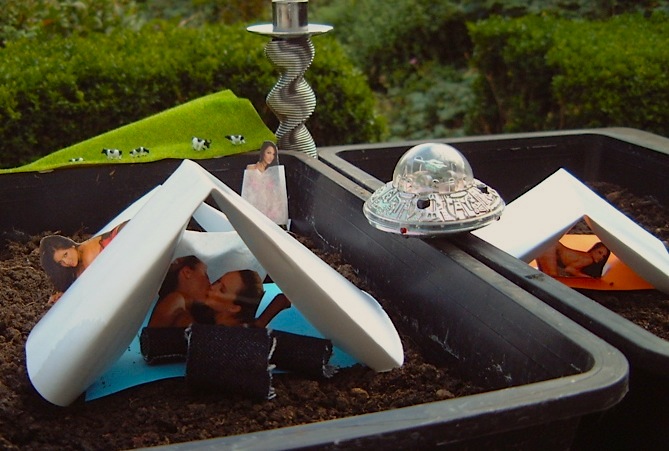
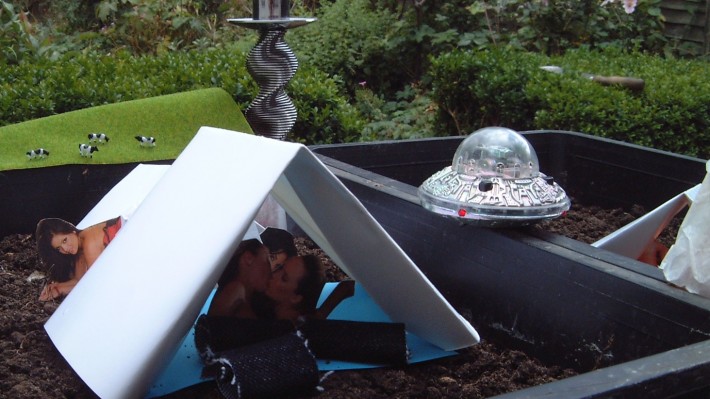

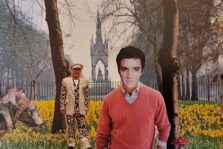


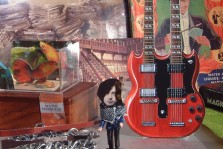
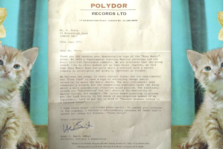


Nice article, funny and scary at the same time, wasn’t sure whether to laugh or scream so I did both. Ha.